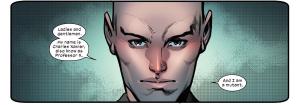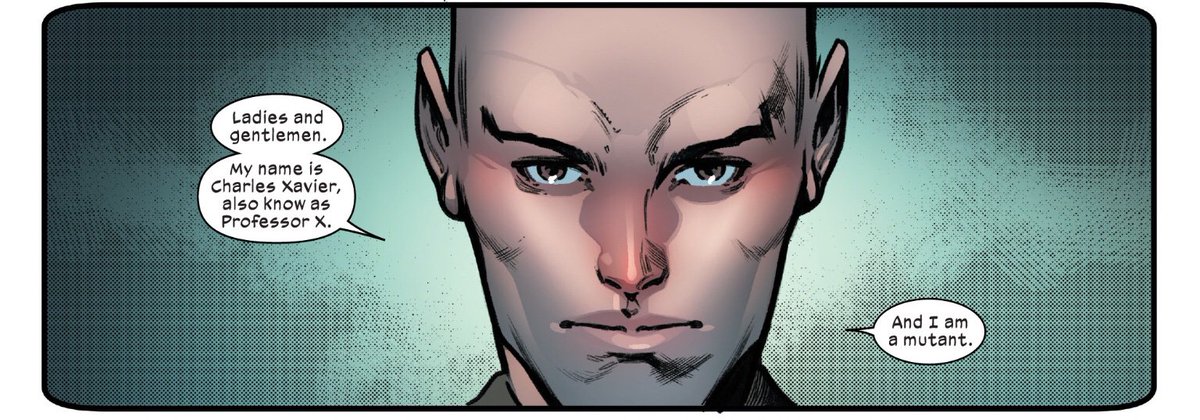While you slept, the world changed.
I haven’t reviewed any comics on this blog for a while, so today we’ll talk about Jonathan Hickman’s triumphant (so far) return to Marvel: House of X/Powers of X and the upcoming Dawn of X wave of books. Spoilers abound so be aware. Also while writing this I realized how absurd comic books must seem to nonreaders, but really that’s what makes it all fun! (I mean, the Justice League is also crazy right now too!)
For the unaware, House of X and Powers are X are two 6-issue miniseries to chart a new direction for the X-Men books moving forward. The architect of this new direction is writer Jonathan Hickman, known for his big status quo-changing ideas. His previous run on Avengers culminated in the multiverse-changing events Infinity and Secret Wars 2, so expectations were high for his X-Men run.
HoX/PoX is really two miniseries that are closely intertwined, enough to be considered a single 12-issue maxiseries. And Hickman is certainly presenting some big ideas, some of it retconning a lot of what was previously known in the X-Men’s history. The main conceit is that Moira MacTaggert is revealed to be (and always has been) a mutant - with the power to reset the timeline back to her birth if she dies after her mutant powers have manifested. Prior to the current storyline in HoX/PoX, Moira has lived through nine of her own timelines, and she has used each successive timeline to figure out how to get mutantkind to “winning” in the inevitable conflicts against humanity and technology.
The 12 issues of HoX/Pox are told in a nonlinear fashion, with the opening issue of House of X showing Xavier’s new plan for mutantkind to become an independent nation on the living island of Krakoa - a far cry from Xavier’s dream of “coexistence” that has defined the X-Men since the very beginning. House of X tells the story of the establishment of this mutant nation, and the incredible resurrection workflow developed using a combination of mutant powers that means that the trope that X-Men don’t stay dead is now canon.
Powers of X covers the Moira affair, what happens in her different timelines and what she discovers. In this week’s final issue of Powers of X, we get the final revelation that she discovered in her sixth life: there is no victory. Mutantkind loses, and they always lose, inspite of the belief that mutants were the inevitable successor to humanity. This leads to her decision in her tenth life to try a completely new approach: to get all the mutants (heroes and villains) working together for a common cause. And to do this, she has to break Charles Xavier, whose optimistic dreams never work out and inevitably lead to conflict with others like Magneto.
The 12 issue maxiseries has concluded, but we are still left with a lot of burning questions. For me, foremost in my mind is: is this really the main 616 Marvel universe? All signs point to yes, but the main issue is that this is a massive upheaval of the X-Men status quo. Typically a writer during his run will introduce some fresh ideas but somewhere down the line some other writer will roll back some of those changes and we revert to some version of the status quo. This feels different, like there’s no coming back from it, because the fundamental nature of the mutants and their conflicts has forever been changed.
It is also unclear at this point what the endgame is for Moira and Charles this time around. How does the Krakoa plan change the inevitable loss to an artificially-evolved post-humanity? There are still redacted portions of Moira’s notes in the last PoX, and she refuses to let any precogs live on Krakoa, implying she (or they) still have something to hide about the future. It would have been naive to assume all our questions would be answered before the end of Hickman’s run (which may end up being 2-3 years long, comparable to his Avengers run.)
During a previous issue, precog Destiny also implied that Moira may live up to 10 or 11 lives, and Moira is only on her 10th. It is still possible that this current timeline gets “reset” at some point and Moira gets to live an 11th life, albeit she may have to do so without her mutant powers. That 11th life could still possibly be the 616 as we know it, although that would mean the rest of Hickman’s run would be reset later on, so that seems even more unlikely. In order for this current timeline (Moira X) to stick, she would have to be depowered, so that when she eventually dies the timeline doesn’t reset.
I’m trying to imagine what the X-Men are going to look like post-Hickman. If it’s true that mutantkind “always loses”, then his run has one of two outcomes: (a) whatever Moira is planning succeeds and mutantkind wins, establishing itself as the successor to humanity, and in which case I’m not sure what future X-Men stories look like after that; or (b) Moira’s plans fall apart, and mutantkind loses yet again. (b) seems far more likely, with Destiny pretty much introduced as Chekov’s gun that Mystique is going to demand be used later on. Of course, knowing Hickman, all of this may very well culminate in some sort of status quo-shattering climax a few years down the line that nobody would have expected. (I certainly didn’t predict a multiversal collapse at the start of his Avengers run!)
Some other minor notes and questions:
- I kind of still question the inevitability of mutants losing since there it at least one known timeline where mutants “won” and humanity was reduced to almost nothing, and that was Age of Apocalypse (though, the mutants kind of ruined that timeline for themselves).
- the mutant resurrection engine seems quite fragile, since it’s reliant on five different mutants (six counting Xavier), so any one of them dying could disable the resurrections permanently
- while we understand why Charles behaves so radically different from previous incarnations (because Moira had succeeded in breaking him), a lot of the other X-Men still feel very out of character, especially the cultish behavior in House of X #5
- the introduction of Dominions, godlike entities existing outside of space and time, is a completely new addition to Marvel cosmology AFAIK
- why is all of this happening now? After all these years, why have Moira, Charles and Erik decided to start their Krakoa nation at this point in time? What was the triggering event?
- I haven’t said much about the art in these two series, because the implications of the story are already a lot, but the art is great, although by the end a lot of the faces seemed a bit samey to me. But I especially like a lot of the coloring work, especially in the X2 timeline and during the assault on the Mothermold
Actually, there are a lot of other details and questions arising out of the maxiseries, which we assume Hickman will resolve during the next few years of X-books. Regardless of where his run ends, just the beginning of it is already a huge success in that it has sparked a lot of discussion about the X-Men and their future in the online communities, not to mention being the best-selling comic book titles for the past 12 weeks. The hype is real, and is a fresh shot in the arm to a franchise that was a bit weakening after years of the “mutant extinction” following House of M back in 2005. I have no idea where Hickman is taking us during this run, but I dig it, and I’m down for the ride.
PS I’m still angry about this (from House of X #1):



See Also